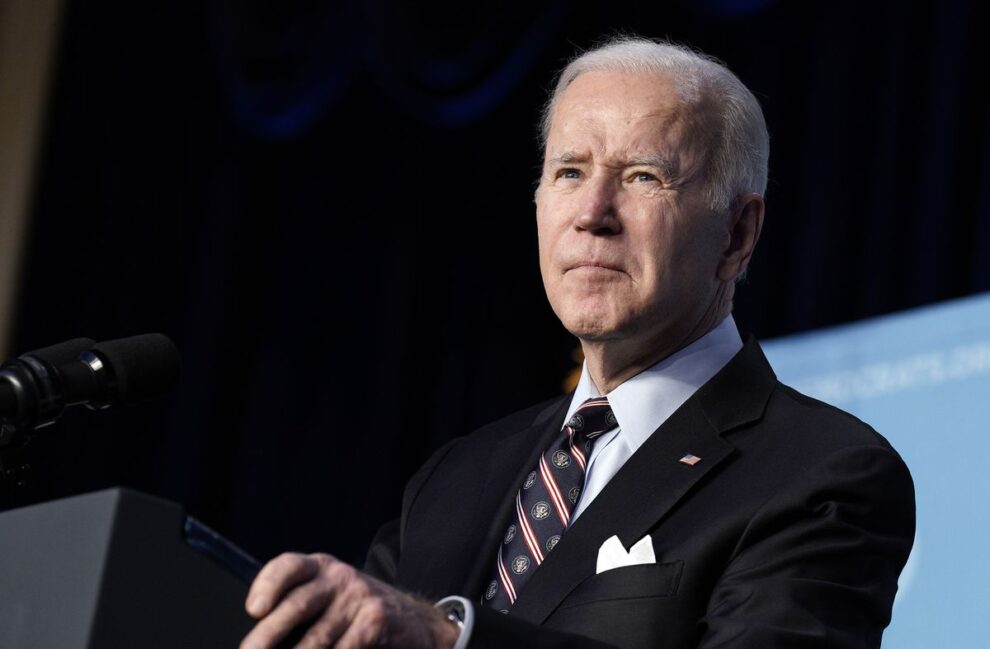President Biden has a new Congress, specifically with an already dysfunctional House of Representatives likely to explode at a moment’s notice. But he’s still pushing his own slightly confused tech agenda, which is a mix of accurately diagnosing some problems, misdiagnosing others, and being vastly confused about potential solutions for all of them. It’s unfortunate that it appears there is still no real growth among Biden or (apparently) his top tech advisors on actually understanding the various issues at work. It’s as if he’s been frozen in time, and looking solely at the issues as they were a decade ago, rather than what they are today.
The American tech industry is the most innovative in the world. I’m proud of what it has accomplished, and of the many talented, committed people who work in this industry every day. But like many Americans, I’m concerned about how some in the industry collect, share and exploit our most personal data, deepen extremism and polarization in our country, tilt our economy’s playing field, violate the civil rights of women and minorities, and even put our children at risk.
The issue here is that this framing is (again) a mix of partially correct, partially wrong, and partially misleading. There are reasonable concerns about the data collection aspect, but, as we’re seeing there are increasingly ways to avoid giving those platforms your data. With social media companies like Meta and Twitter losing steam, we have opportunities to move away from the big giants collecting all your data.
Regarding “deepening extremism and polarization,” the data… just doesn’t support that at all. I know the mainstream media narrative keeps repeating it, but the actual studies don’t support it at all. And we shouldn’t be making policy based on mainstream media narratives over actual facts and evidence. Of course, perhaps the reason the mainstream media keeps pushing this narrative is that the mainstream media has been shown by studies to be way more guilty of deepening extremism and polarization.
And I’m not at all clear what Biden means by “tilting our economy’s playing field.” The tech industry, for the most part has enabled way more people to have access to way more information and opportunities than in the past. Perhaps he’s arguing that some big companies have too much power, and on that I’d mostly agree (though that’s not what he says here), but as we’ve seen basically all of the tech giants have been in free fall this past year, and it seems like the market is doing its job in humbling them and putting forward competitors.
The issues regarding “civil rights of women and minorities” and putting “our children at risk” again… I’m not sure directly what this is referring to, but the evidence about children and social media has not shown any definitive increase in risk or harms, contrary to the media narrative.
Biden’s solutions, then, are still confused, based on media narratives more than facts, and an outdated view of the internet.
First, we need serious federal protections for Americans’ privacy. That means clear limits on how companies can collect, use and share highly personal data—your internet history, your personal communications, your location, and your health, genetic and biometric data. It’s not enough for companies to disclose what data they’re collecting. Much of that data shouldn’t be collected in the first place. These protections should be even stronger for young people, who are especially vulnerable online. We should limit targeted advertising and ban it altogether for children.
I mean, yes, the US needs a federal privacy law, but the devil’s in the details, and Biden (and his team) don’t seem to care much about the details and the problems with the details. Just as an example, he talks about “limiting targeted advertising and banning it altogether for children.” And, on a first pass that sounds good. But how do you do that in practice?
The only way to “ban” targeted advertising for children is to know the age of everyone on your website. And that means you actually have to get way more intrusive in collecting data on your users in order to know who is, and who is not, a child. And… that goes against the idea of protecting privacy. If you can’t explain how you handle those trade-offs, it’s difficult to take your big policy proposals seriously, because it makes it sound like you and your team haven’t actually understood the issues.
Second, we need Big Tech companies to take responsibility for the content they spread and the algorithms they use. That’s why I’ve long said we must fundamentally reform Section 230 of the Communications Decency Act, which protects tech companies from legal responsibility for content posted on their sites. We also need far more transparency about the algorithms Big Tech is using to stop them from discriminating, keeping opportunities away from equally qualified women and minorities, or pushing content to children that threatens their mental health and safety.
Yeah, yeah. We’ve heard it all before. Again and again. And it was wrong then and it remains wrong today. Reforming Section 230 to make websites “legally responsible” for the content posted on their sites does not fix any of the problems he describes. Because, first off, most content remains fully protected under the 1st Amendment, including most abuse, harassment, and hate speech. Removing Section 230 won’t change that, and without any underlying tort, making platforms “responsible” won’t matter because there won’t be any content that violates the law.
Second, even if there is content that violates the law, under the 1st Amendment, you can’t just magically say that platforms are “responsible” or “liable” for it. The 1st Amendment has long required that for a third party distributor of the content they need to have knowledge of that content. And not just knowledge that the content exists, but knowledge that the content violates the law. And… that’s just not going to happen in most cases. You don’t get that knowledge until after a court has decided on the underlying question.
Even worse — and this is the important part that Section 230 haters keep ignoring — because of that knowledge standard, taking away Section 230’s protections actually encourages websites to take less responsibility, because the more responsibility they take, the more monitoring they do, the more likely they are to be found to have knowledge, and thus liable.
So Biden’s big plan here would actually encourages websites to turn a blind eye to bad stuff on their platform.
It is frustrating beyond belief that no one in the administration seems to understand this simple way in which the law works. They’ve had plenty of time to talk to actual experts, but they seem to have ignored them all, in favor of a small crew of activists who have never understood the law at all, and spread blatant falsehoods and misinformation about Section 230.
Biden’s solution would make the problems he describes worse, not better. It would tie the hands of websites who are actively trying to stop abuse and harassment on their platforms and it would make it nearly impossible for smaller upstarts (you know, the ones successfully chipping away at the big companies Biden was just complaining about) to exist.
As for the “transparency about algorithms,” we’ve explained multiple times why that’s problematic as well. First, it’s a censorship bill in disguise, which raises 1st Amendment issues. Second, it’s demanding transparency into editorial decision making, which everyone recognizes would be a problem if the Biden administration demanded to know what stories Fox News or the NY Times decided were the most important. That’s not something the government has a right to discover.
Third, all of these things, it would limit the ability of new upstarts that are giving control back to the end users to exist. Right now we’re seeing amazing growth of the fediverse, but without Section 230 and with certain transparency demands, I don’t see how anyone in the US could feel comfortable running a Mastodon instance, for example.
Third, we need to bring more competition back to the tech sector. My administration has made strong progress in promoting competition throughout the economy, consistent with my July 2021 executive order. But there is more we can do. When tech platforms get big enough, many find ways to promote their own products while excluding or disadvantaging competitors—or charge competitors a fortune to sell on their platform. My vision for our economy is one in which everyone—small and midsized businesses, mom-and-pop shops, entrepreneurs—can compete on a level playing field with the biggest companies. To realize that vision, and to make sure American tech keeps leading the world in cutting-edge innovation, we need fairer rules of the road. The next generation of great American companies shouldn’t be smothered by the dominant incumbents before they have a chance to get off the ground.
More competition is a worthy goal. But, here’s the thing: as I detailed in my end of the year post a couple weeks ago, we’re already seeing that. And many of the policies Biden is pushing will make that much harder, not easier. It’s almost as if the only people talking to Biden on this are focused on their own little silos without realizing how the “privacy laws” and the “get rid of 230” push will actually do more to lock in big companies and kill off upstart competitors.
This isn’t how policy should be made.
Of course, the fact is, these are almost the identical policy statements Biden made upon taking office two years ago. And at that time, his party had effective control over both houses of Congress… and couldn’t get any of those tech policy initiatives through (he did get many other things through, but none of these policies). And, in that time, the tech world has also changed a lot, though it sure feels like no one in DC has noticed. Meta is collapsing, shedding users and revenue, and throwing away billions on a metaverse concept almost no one seems interested in. Google seems stymied by an inability to figure out where things go from here, and we’re seeing innovations jumping out from much smaller operations like OpenAI. And, of course, the growth of new alternatives, including those not controlled by the big companies, gives hope that we’re on the right path.
Maybe long wasteful antitrust battles distract those companies for a while, but those lawsuits are already ongoing (and so far haven’t been going all that well).
All of this just seems to be missing what’s actually happening in the tech space today and how to encourage it. It doesn’t look at the ways in which copyright and patent laws are holding competition back. Or how an outdated CFAA is allowing the big companies to stomp out smaller upstarts. These are real issues that could be dealt with. Instead, we get this same nonsense about 230 and antitrust.
And the fact is that with this current dysfunctional Congress, it seems even less likely that Biden’s confused wishlist is going to get anywhere.
Source : Tech Dirt















